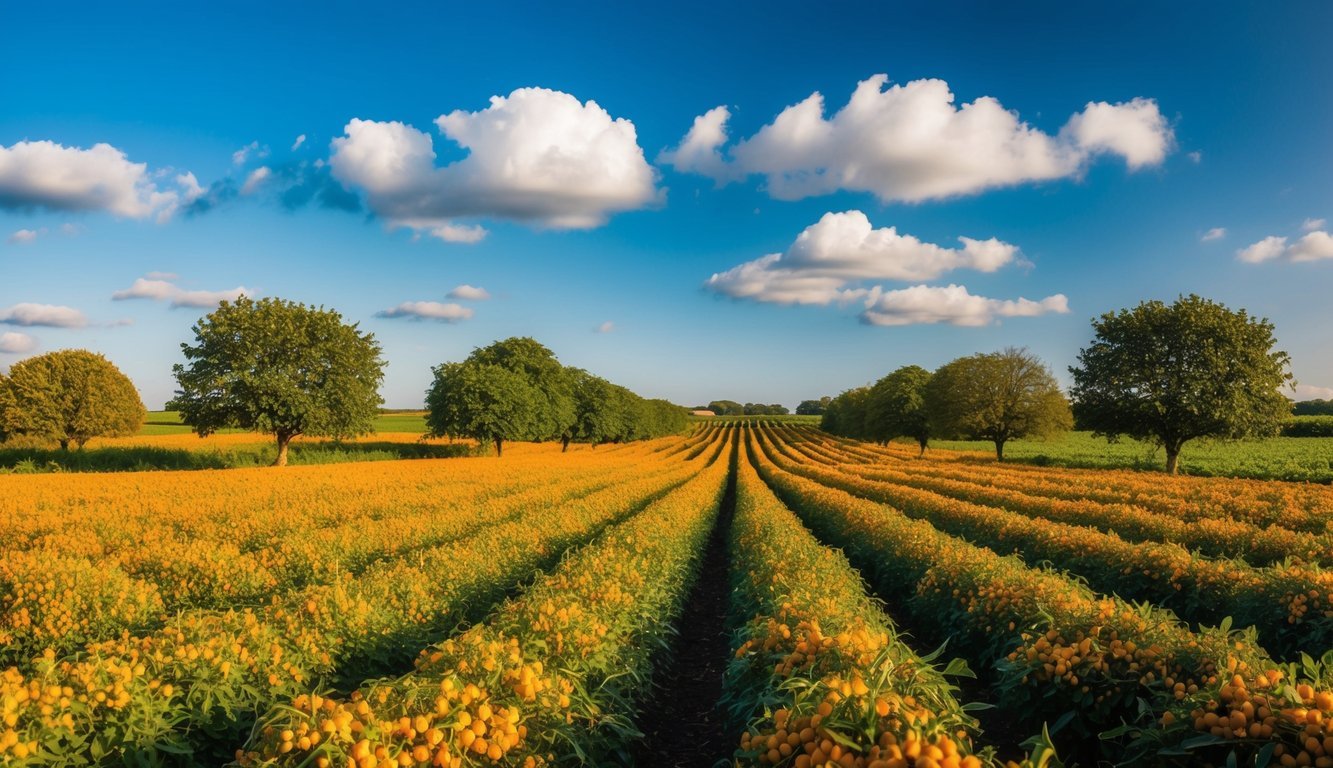
Climate change is set to pose serious challenges for agriculture in the UK over the next few decades.
However, it also opens doors for the cultivation of crops like chickpeas, soybeans, and oranges, which have typically thrived in warmer regions.
By the year 2080, products like locally sourced hummus, tofu, and marmalade could become fixtures on supermarket shelves.
Opportunities for New Crops
A recent study by the UK Centre for Ecology & Hydrology (UKCEH) and the University of East Anglia (UEA) reveals that rising temperatures will create favorable conditions for various crops traditionally associated with warmer climates.
This includes not just chickpeas and oranges, but also okra, among others.
The research scrutinizes the potential for over 160 established and emerging crops across the UK under warming scenarios of 2 and 4 degrees Celsius compared to pre-industrial temperatures.
This extensive modeling, part of the OpenCLIM initiative, represents one of the most thorough studies undertaken, providing detailed insights into how the suitability of different crops might shift across various UK regions.
It also offers mapped predictions for every square kilometer, which can be invaluable to farmers and the food industry as they navigate future agricultural opportunities and challenges.
Challenges and Risks
Dr. John Redhead, a Spatial Ecologist at UKCEH and the study’s lead author, highlights the significance of these changes.
He notes that climate shifts are on the horizon, coupled with escalating food demands driven by population growth.
He argues that adapting arable farming practices, such as diversifying crops to fit new local conditions, is crucial for enhancing agricultural resilience.
Already, the impact of climate change is evident in the UK, with several years of record low crop yields attributed to extreme weather events.
Various combinations of weather patterns, like wet winters followed by dry springs, have created difficult growing conditions.
The emergence of new agricultural pests and diseases is another complication linked to climate variations.
The study points out several crops that are not just withstanding increased temperatures and drier summers, but are also flourishing during milder, wetter winters.
It evaluates future climate conditions to see if certain crops will become more or less suitable compared to historical temperature averages, which currently stand at approximately 0.5 degrees Celsius above pre-industrial levels.
Key takeaways from the research include:
- A broader range of existing and new crops is likely to find suitable growing conditions across the UK due to climate change.
- Specific crops such as wheat and strawberries may see diminished viability, particularly in the South East and East Anglia, the country’s most productive agricultural zones, especially under a 2-degree rise.
If temperatures were to increase by 4 degrees, major crops like onions and oats could also face challenges.
- Conditions will become increasingly favorable for previously uncommon crops in the UK, such as sunflowers, durum wheat, soybeans, cowpeas, citrus fruits, okra, and even wine grapes.
Future Considerations for Agriculture
The authors stress that global food supply relies heavily on a limited variety of crops.
For improved food security and climate resilience, increasing agricultural diversity is key.
Introducing legumes like chickpeas and soybeans—recently harvested commercially in the UK—will significantly contribute to sustainable diets.
These crops not only provide essential protein but also facilitate a shift from high meat consumption, aiding in the journey toward diets with a lower carbon footprint.
Legumes also enrich the soil with nitrogen, reducing the need for fertilizers.
While the changing climate in the UK is unlocking opportunities for new crops, the research shows that the greatest suitability will be found in the southwest and the Scottish borders.
In these areas, the advantages of higher temperatures largely offset potential summer water shortages, especially under a 4-degree scenario.
Nonetheless, the UK’s geographical diversity presents significant challenges.
Regions outside the South East and East Anglia often have small field sizes and varied terrains, which can disrupt the establishment of new food processing and supply chains.
Additionally, the shift towards new farming practices carries economic risks, and introducing crops into new environments could have unintended effects on pollinators and pest populations.
Dr. Redhead emphasizes the difficulties of shifting large-scale food production.
While relocating operations from the thriving agricultural heartlands of southeastern England to Scotland seems improbable, adapting to the ongoing impacts of climate change requires careful consideration of food sourcing and agricultural management strategies.
The study suggests several approaches to address these challenges, including:
- Further investigation into the viability of crops expected to thrive.
- Restructuring supply and distribution networks to assist farmers transitioning to new crops in different regions.
- Embracing innovative practices like paludiculture (wet farming) and indoor vertical farming.
- Developing more resilient varieties of staple crops better suited to heat and drought.
While it’s complex to predict which crops will thrive or be profitable by 2080, this research provides clarity on the climatic suitability of various crops across specific regions, a critical factor for embracing new agricultural ventures.
Co-author Professor Rachel Warren from the Tyndall Centre for Climate Change Research at UEA highlights the importance of this research data in helping to avoid a scenario where agricultural systems remain fixated on current crop choices, potentially leading to inadequate adjustments to climate challenges.
Practices that exacerbate climate impacts, such as excessive irrigation, can further strain water resources.
She also points out that significant shifts in agricultural practices and diets often require decades to implement.
Consequently, the long-term projections from this study are essential for farmers, supermarkets, researchers, policymakers, and the public, providing valuable insights into the opportunities, challenges, and trade-offs associated with adapting to climate change.
The authors believe that their horizon-scanning approach could serve as a model for other countries grappling with similar climatic challenges.
Source: Science Daily

